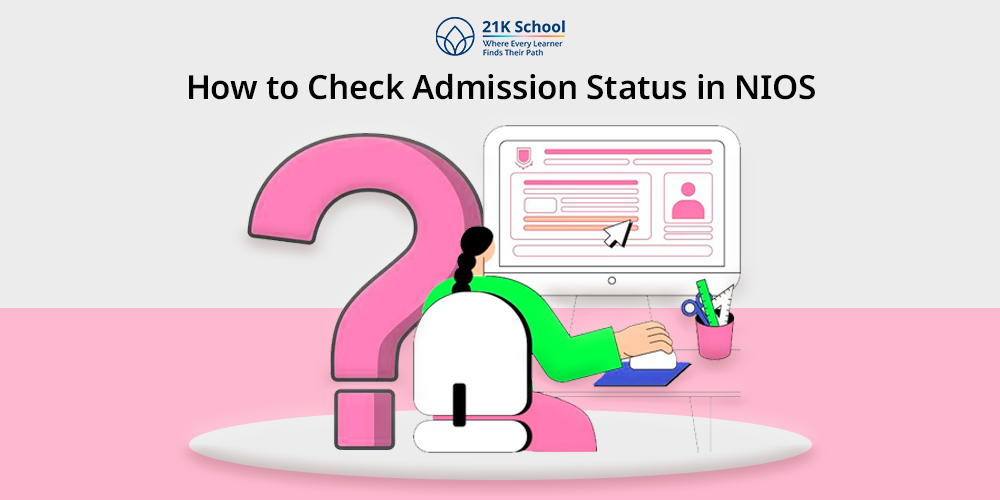
As the A-Level Results Day comes closer, tension obviously increases among students in the United Kingdom.
The finale or we can say the result day is the crowning moment of this year of hard work and preparation students have been doing.
Regardless of the nature or combination of emotions an individual has leading up (anxiety, excitement, etc.), one needs to know exactly what one needs to expect and so, to make this quite a stressful day a little bit less dreadful, we at 21K School have come up with a detailed checklist.
Read on to be fully prepared for this big day!
Table of Contents
What Happens on A-Level Results Day 2024?
A-Level Results Day for any year often falls in August.
Gazette Education and school Institutions within Great Britain shall release results for learners to know their performance, make decisions on admissions to universities, and what their next step should be.
On the day:
- Students can come and get their various results physically at their respective schools or colleges during the morning hours.
- Further, results are also made available by exam boards and UCAS and as a result, can be accessed from any location.
- Universities normally start sending out offer confirmations once results are out so it is important to check UCAS status regularly.
This day is not as simple as opening an envelope or clicking a link – It is the day that determines your planning for the future.
The idea is to be in possession of the right information if it is a question of university, apprentices, or even decisions to take a gap year.
How to Prepare for A-Level Results Day
The preparation shows that one can learn how to cope with stress and anxiety on A-Level Results Day. Here are a few steps to ensure you’re ready:
- Know the Logistics: Check when and where you will get your results or if you will be able to get your results online.
- Bring Essential Documents: Make sure you have your ID, UCAS number, and any letter from your school/college.)
- Stay Informed: Clearing, adjustment, and appeal may occur; thus it is wise that you prepare yourself with all possibilities that may occur.
- Have a Support System: Whether it’s parents, friends, or a teacher, make sure there is someone to talk to or celebrate when they achieve something.
- Plan Ahead: Make a list of other Universities or courses to attend if one is not met as per the terms set down in a conditional offer.
- Practice Self-Care: Get the right amount of sleep, eat right, and ensure you are well-hydrated so that your mind is very clear.
Over-preparation is not only about checklists and schedules; it is also about the heart. It’s often possible to take charge and feel more in control if you just spend a bit of time thinking about what you want to do.
For a complete list details about A-Level Curriculum, read The A-Levels Curriculum: A Professional Overview
How Do I Get My A-Level Results?
Students can use several means to obtain their A-level results. Here’s a detailed breakdown:
1. Collecting in Person
It is typical to receive results in most schools and colleges in the morning hours.
Punctuality is important to avoid getting stressed and more important for seeking assistance from teachers or counselors.
2. Online Access
Examining boards and University and Colleges’ Admissions Services enable learners to be awarded their results online.
Make sure that you know your login details for the school or exam board portal in advance so you don’t get caught unawares.
3. Through UCAS Track
UCAS Track is updated early on Results Day to indicate whether your university applications have been offered.
It doesn’t report individual grades but tells you whether or not you have fulfilled the conditions of your conditional offers.
4. By Post
Several institutions allow you to receive your results by mail. This is less common but helpful for those learners who cannot attend the class physically.
Tips:
- If checking online, be sure you have a good connection to the internet if you are to obtain the most from the resources.
- It is just in case you have your UCAS Personal ID so that it will not take time to locate always.
- Cross-check the table from your school or exam board so that you do not find yourself tardy.
What Time Are A-Level Results Released?
A-level results are typically released at 8:00 AM on Results Day. However, times may vary from school to school, college, or an online course section to another.
Key Points:
- UCAS Track: Sometimes updates at dawn, help students to check on their university admission status while waiting to get their results.
- Schools/Colleges: Distribution starts a little after 8:00 AM, though the quantity may vary – it is advisable to contact and establish this.
- Exam Boards: Other facilities such as Edexcel Online or AQA results portals will normally become available simultaneously.
Knowing these, at least, makes one prepared for the release timings rather than getting worked up at the last minute.
What Happens After Receiving Your A-Level Results?
Depending on what you got, there may well be certain procedures that you will have to undergo, based on the general performance you have scored on the results. Here’s what to consider:
1. Meeting Your University Offer
- If you meet all the conditions of the offer then many congratulations to you. After, UCAS will change your status to the “Unconditional” one.
- In case of enrollment details from your university, wait for your email for further instructions.
2. Entering Clearing
- If you haven’t met your offer, you should not get worried yet. Through clearing you get to identify other courses that may be offered with available spaces.
- Track down options in UCAS Track to contact the university of your choosing.
3. Considering Adjustment
- If you have done better than your expected grades then you might want to consider a better course at university through adjustment.
- It also assists students in transitioning to a particular higher-ranked program from another one.
4. Taking a Gap Year
Some learners are sometimes disoriented as to what they want to do in the future; therefore, a gap year can be very useful for gaining employment, traveling, or preparing for resits.
5. Resitting Exams
- If you are not happy with the results you achieved, talk to your school about the details referring to resits.
- It must said that many students are able to enhance their grades by using this avenue.
Can I Appeal My Grades If Not Satisfied?
Yes, you can fight for your grades if you think that you have been marked or graded unfairly. The process involves:
- Speaking to Your School: They will then use their contacts to engage the given exam board on your behalf.
- Providing Evidence: It also means that you will have to explain why in your opinion an error has occurred.
- Waiting for Review: Exam boards will go through your paper but it’s important that understand that your grade can increase, decrease, or even stay the same.
Just know that the deadlines are usually within weeks of Results Day as appeals cannot always be instant.
To know how your copy are being accessed, read Understanding the A-Levels Grading System: A Guide for Students
What If I Get Better Grades Than I Expected?
Doing better than expected grades provides one with an adrenaline rush and access to other opportunities one may have never thought of.
Here’s how to make the most of your unexpected success:
1. Explore Adjustment
The Adjustment process with the UCAS allows any learner who received higher results than their initial offer on average to change their course or university.
This is good if your results are higher than the entry tariffs for your preferred firm.
- How it Works: Adjustment is possible (A-Level Results Day is marked until the end of August). Through UCAS Track you can opt for Adjustment.
- Benefits: You could attend a better-ranked, equipped, or structured university or program to better meet your ambition.
- Tips: Ask your school or university or the university you considering for advice on Results Day. Identify some Universities /Courses you would like to transfer to and as soon as possible, directly contact the University/Course Admission Offices to know if they have spaces available.
2. Reevaluate Your Options
Desirable results in your subjects make you change your academic or career track.
The result is that there may be certain courses or institutions in which you never thought you would be able to enroll in the first place.
- Upgrading Your Course: Maybe you were trumping for a less competitive course say due to grade prediction more so with many of us willing to shun a career in computer science. Better grades might enable you to try to get into a tough or better program.
- Considering Alternative Paths: This means that some learners look for other fields in almost different areas that they have discovered that one can be able to achieve through the system such as transfer from an arts program and sciences program.
- Advice: New options should be discussed with teachers, career advisors, or university admission officers in order to discuss the pros and cons of any change.
3. Celebrate Your Success
It is such a great success to get better results than anticipated as such demonstrates effort, commitment, and tenacity.
Savor this moment because the phase of decision-making will begin immediately.
- Share Your Joy: People should spend time with their family and friends after suffering when they are the only ones giving the candidate support.
- Self-Reward: Here, use the opportunity to make something with content value – be it a holiday, gift, or an excursion to mark success.
- Confidence Booster: Take this success as a factor in other projects in the future that exactly because of this, you have achieved so much.
Have a look at With Online Schooling, every student succeeds – Here’s how?
Conclusion
A-Level Results Day is one of the days that shape your lives as they signal the beginning of a new chapter of your lives.
Regardless of whether it is a year at university, a year out, or a new job, it is always good to be in the know and ready so that stress is minimized for the day and that the day goes as smoothly as possible. Good Luck!



